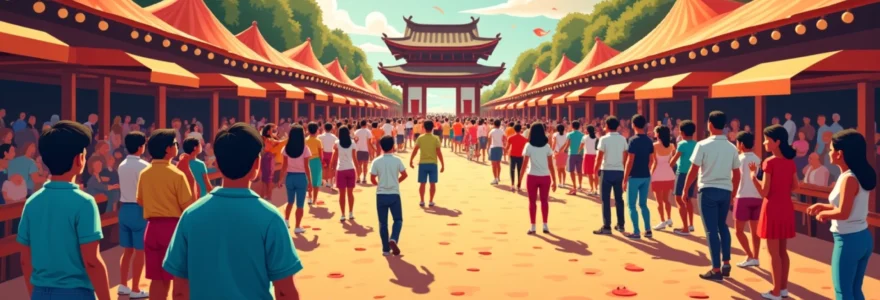Cultural festivals stand as vibrant testaments to the rich tapestry of human diversity, serving as powerful catalysts for unity and international exchange. These celebratory events transcend borders, bringing people together through shared experiences of art, music, food, and traditions. As globalisation continues to shape our world, cultural festivals play an increasingly vital role in fostering cross-cultural understanding and appreciation. They offer unique opportunities for individuals to immerse themselves in unfamiliar customs, broadening perspectives and challenging preconceptions.
The impact of these festivals extends far beyond mere entertainment, touching on aspects of diplomacy, economics, and social cohesion. From the bustling streets of Rio during Carnival to the serene temples of Japan during Matsuri, cultural festivals serve as windows into the soul of a nation, inviting participants to connect with the essence of diverse cultures. As we delve into the multifaceted nature of these celebrations, we’ll explore how they contribute to building bridges between nations, preserving heritage, and driving economic growth in an increasingly interconnected world.
Cultural anthropology of Festival-Driven social cohesion
The study of cultural festivals through an anthropological lens reveals fascinating insights into how these events foster social cohesion. Festivals serve as microcosms of society , where cultural norms are both displayed and negotiated. They provide a unique space for communities to reaffirm their collective identity while simultaneously opening doors to outsiders. This dual function of festivals – reinforcing internal bonds while facilitating external connections – is crucial in understanding their role in promoting unity.
Anthropologists have long recognised the significance of rituals and celebrations in maintaining social order. Cultural festivals, in this context, act as large-scale rituals that reinforce shared values and beliefs. They create a sense of communitas , a term coined by anthropologist Victor Turner to describe the intense feeling of social equality and togetherness experienced during rituals. This phenomenon is particularly evident in festivals that involve collective participation, such as India’s Holi or Spain’s La Tomatina.
Moreover, festivals often serve as platforms for cultural exchange at a grassroots level. When international visitors participate in local celebrations, they engage in what anthropologists call ‘cultural borrowing’. This process involves the adoption and adaptation of cultural elements, leading to a form of organic globalisation. For instance, the spread of Halloween celebrations beyond the United States exemplifies how festivals can transcend their original cultural boundaries and foster international connections.
Ethnographic analysis of Cross-Cultural celebrations
Ethnographic studies of cross-cultural celebrations provide valuable insights into the mechanics of international exchange through festivals. These in-depth, immersive research methods allow scholars to observe and analyse the intricate ways in which festivals bring diverse groups together. By participating in and documenting these events, ethnographers capture the nuanced interactions that occur when different cultures intersect in a festive environment.
Case study: oktoberfest’s impact on German-International relations
Oktoberfest, the world-renowned Bavarian beer festival, serves as an excellent case study for understanding how cultural festivals can impact international relations. Originally a local celebration, Oktoberfest has evolved into a global phenomenon, attracting millions of visitors from around the world to Munich each year. The festival’s popularity has led to the creation of satellite Oktoberfest celebrations in numerous countries, effectively exporting a slice of German culture abroad.
Ethnographic research has shown that Oktoberfest creates a unique environment where cultural barriers are lowered, and international visitors engage with German traditions in a joyful, immersive manner. The shared experience of donning traditional Dirndl and Lederhosen , singing German folk songs, and partaking in Bavarian cuisine fosters a sense of camaraderie among participants of diverse backgrounds. This cultural immersion, albeit temporary, contributes to a more nuanced understanding of German culture among international visitors, potentially influencing broader perceptions of Germany on a global scale.
Diwali’s role in Indo-Western cultural exchange
Diwali, the Hindu festival of lights, offers another compelling example of how cultural festivals facilitate international exchange. As the Indian diaspora has grown globally, Diwali celebrations have taken root in numerous Western countries. This expansion has led to a fascinating interplay between traditional Indian customs and local cultural elements in host countries.
Ethnographic studies of Diwali celebrations in cities like London, New York, and Sydney reveal how the festival has become a platform for cultural diplomacy. Public Diwali events in these cities often feature a mix of traditional Indian performances alongside Western entertainment, creating a hybrid cultural experience. This fusion not only allows the Indian diaspora to maintain connections with their heritage but also introduces non-Indian populations to aspects of Hindu culture in an accessible, celebratory context.
Carnival of rio: bridging socioeconomic divides through samba
The Carnival of Rio de Janeiro stands as a powerful example of how cultural festivals can bridge socioeconomic divides within a society while also attracting international attention. This world-famous celebration, characterised by its elaborate parades, vibrant costumes, and pulsating samba rhythms, temporarily transforms the social landscape of Rio, bringing together people from all walks of life.
Ethnographic research has highlighted how the Carnival’s samba schools, which are often rooted in Rio’s favelas (slums), become focal points of community pride and mobilisation. The preparation and performance of samba during Carnival provide opportunities for socioeconomic integration, as individuals from different backgrounds collaborate in creating spectacular displays. For international visitors, participation in the Carnival offers a unique insight into Brazilian culture, fostering cross-cultural understanding and appreciation.
Chinese new year: diaspora communities and homeland connections
Chinese New Year celebrations around the world offer a fascinating lens through which to examine how cultural festivals maintain connections between diaspora communities and their ancestral homeland. As one of the most widely celebrated festivals globally, Chinese New Year serves as a powerful tool for cultural preservation and exchange.
Ethnographic studies of Chinese New Year celebrations in cities with significant Chinese populations, such as San Francisco, Sydney, and London, reveal how these events strengthen community bonds while also engaging the broader local population. The public nature of many Chinese New Year festivities, including street parades and temple fairs, creates opportunities for cultural exchange on a large scale. Moreover, these celebrations often incorporate elements of local culture, resulting in unique hybrid forms that reflect the evolving identity of Chinese diaspora communities.
Economic implications of cultural festival tourism
The economic impact of cultural festivals extends far beyond the immediate celebration period, often serving as significant drivers of tourism and local economic development. These events can transform cities and regions, attracting visitors from around the world and stimulating growth across various sectors. The phenomenon of festival tourism has gained increasing attention from economists and policymakers, recognising its potential to boost local economies and promote international exchange.
Edinburgh fringe festival: creative economy catalyst
The Edinburgh Fringe Festival stands as a prime example of how cultural festivals can serve as catalysts for the creative economy. As the world’s largest arts festival, the Fringe transforms Edinburgh each August into a global hub for performers, artists, and cultural enthusiasts. The economic impact of this transformation is substantial, with the festival generating millions of pounds for the local economy through ticket sales, accommodation, dining, and related services.
Beyond the immediate economic boost, the Fringe Festival has played a crucial role in establishing Edinburgh as a year-round cultural destination. The festival’s success has led to the development of a robust creative infrastructure in the city, supporting a thriving arts scene that continues to attract visitors and investment long after the festival concludes. This demonstrates how cultural festivals can serve as cornerstones for sustainable economic development strategies focused on the creative industries.
Coachella valley music and arts festival: local economic transformation
The Coachella Valley Music and Arts Festival in California offers an intriguing case study of how a cultural festival can transform the economic landscape of a region. Since its inception in 1999, Coachella has grown into one of the most renowned music festivals globally, attracting hundreds of thousands of attendees and generating significant revenue for the local economy.
The festival’s economic impact extends well beyond ticket sales and on-site spending. Coachella has put the Coachella Valley on the global map, boosting tourism year-round and attracting investment in hospitality and entertainment infrastructure. The festival has also spurred the growth of ancillary industries, from event production to digital marketing, creating a diverse ecosystem of businesses that benefit from and contribute to the festival’s success.
Japan’s matsuri festivals: traditional crafts preservation and global market access
Japan’s numerous Matsuri festivals not only celebrate cultural heritage but also play a crucial role in preserving traditional crafts and providing global market access for local artisans. These festivals, which occur throughout the year across Japan, often feature displays and sales of traditional crafts, from ceramics and textiles to woodwork and metalcraft.
The economic significance of Matsuri festivals lies in their ability to create a direct connection between artisans and a global audience. By attracting international visitors, these festivals serve as showcases for Japanese craftsmanship, often leading to increased exports of traditional goods. Moreover, the demand generated by Matsuri festivals helps sustain traditional craft industries, ensuring the preservation of techniques and knowledge that might otherwise be lost in the face of modernisation.
Digital age transformation of cultural festivals
The digital revolution has profoundly impacted the way cultural festivals are experienced, organised, and shared globally. As technology continues to evolve, festivals are adapting to incorporate digital elements, expanding their reach and creating new forms of engagement. This transformation is not only changing the nature of festivals themselves but also enhancing their role in fostering international exchange and unity.
Virtual reality experiences in tomorrowland electronic dance music festival
The Tomorrowland Electronic Dance Music Festival in Belgium has been at the forefront of integrating virtual reality (VR) technology into the festival experience. In response to global travel restrictions, Tomorrowland created a fully digital version of the festival, allowing participants from around the world to immerse themselves in a virtual festival environment.
This innovative approach demonstrates how digital technology can break down geographical barriers, enabling cultural exchange on an unprecedented scale. Through VR, attendees can explore a meticulously crafted digital world, interact with other festival-goers, and enjoy performances by international artists. The virtual format also opens up new possibilities for creative expression, with stage designs and visual effects that would be impossible to replicate in the physical world.
Social media’s role in globalizing holi celebrations
Social media platforms have played a significant role in globalizing the celebration of Holi, the Hindu festival of colours. Platforms like Instagram, TikTok, and YouTube have allowed people from around the world to witness and participate in Holi celebrations virtually, sparking interest and inspiring local adaptations of the festival.
The visual appeal of Holi, with its vibrant colours and joyful atmosphere, makes it particularly suited for social media sharing. This has led to the proliferation of Holi-inspired events in countries far from India, often organised by non-Indian communities. The hashtag #HoliFestival has become a global phenomenon, connecting celebrants across continents and fostering a sense of shared experience. This digital amplification of Holi demonstrates how social media can serve as a powerful tool for cultural exchange and unity.
Blockchain technology in festival ticketing: glastonbury’s Anti-Scalping measures
The application of blockchain technology in festival ticketing represents a significant advancement in making cultural events more accessible and secure. Glastonbury Festival, one of the UK’s most prestigious music festivals, has explored blockchain-based ticketing systems to combat scalping and ensure fair access to tickets.
By using blockchain, festivals can create a transparent and immutable record of ticket sales and transfers. This not only prevents fraud but also allows organisers to implement more sophisticated pricing models and attendance policies. For international attendees, blockchain ticketing can simplify the process of purchasing and verifying tickets, potentially increasing the diversity of festival audiences.
Diplomatic soft power through cultural festival exchange
Cultural festivals have emerged as powerful tools of soft diplomacy, allowing nations to showcase their heritage, foster goodwill, and strengthen international relations. These celebrations serve as platforms for cultural exchange, offering a non-political avenue for countries to engage with one another and promote mutual understanding. The concept of soft power, coined by political scientist Joseph Nye, emphasises the importance of cultural attraction in shaping international relations, and cultural festivals exemplify this approach.
Unesco’s intangible cultural heritage list: festival preservation strategies
UNESCO’s Intangible Cultural Heritage List plays a crucial role in recognising and preserving cultural festivals worldwide. By inscribing festivals on this list, UNESCO not only acknowledges their cultural significance but also supports efforts to safeguard these traditions for future generations. This international recognition often leads to increased visibility and support for festivals, both domestically and internationally.
The process of nominating and inscribing festivals on the UNESCO list also fosters international cooperation and exchange. Countries share best practices for festival preservation and management, creating a global network of cultural heritage experts. This collaborative approach not only helps in preserving individual festivals but also contributes to a broader understanding of the importance of cultural diversity in our interconnected world.
Japan-korea festival: bilateral relations improvement through cultural diplomacy
The Japan-Korea Festival serves as a prime example of how cultural celebrations can be used to improve bilateral relations between nations with complex historical relationships. Initiated in 2009, this annual event alternates between Tokyo and Seoul, featuring performances, exhibitions, and cultural exchanges that highlight the shared cultural heritage and contemporary connections between Japan and South Korea.
Despite ongoing political tensions between the two countries, the festival has consistently drawn large crowds and received positive reception from both Japanese and Korean participants. By focusing on cultural similarities and shared experiences, the festival creates a space for positive interaction and dialogue. This grassroots approach to diplomacy complements official governmental efforts, fostering people-to-people connections that can contribute to long-term improvements in bilateral relations.
European capitals of culture programme: urban regeneration and Cross-Border unity
The European Capitals of Culture programme, initiated by the European Union, exemplifies how cultural festivals and events can drive urban regeneration and promote cross-border unity. Each year, selected cities are designated as European Capitals of Culture, receiving support to develop a year-long programme of cultural events and initiatives.
This programme has proven to be a powerful tool for urban transformation, with many cities using their year in the spotlight to invest in cultural infrastructure, revitalise neglected areas, and redefine their international image. The focus on European identity and shared cultural heritage also promotes a sense of unity among EU member states, encouraging cultural exchange and collaboration across borders.
Moreover, the European Capitals of Culture programme often extends its reach beyond EU borders, involving neighbouring countries and fostering a broader sense of European cultural identity. This inclusive approach demonstrates how cultural initiatives can transcend political boundaries, creating connections based on shared artistic and cultural experiences.
As we have explored throughout this article, cultural festivals play a multifaceted role in fostering unity and international exchange. From their anthropological significance in building social cohesion to their economic impact on local communities, these celebrations serve as powerful catalysts for cross-cultural understanding and appreciation. The digital transformation of festivals has further amplified their global reach, creating new opportunities for participation and engagement across borders. Finally, the diplomatic potential of cultural festivals underscores their importance as tools of soft power, capable of improving international relations and promoting mutual respect among diverse cultures.


